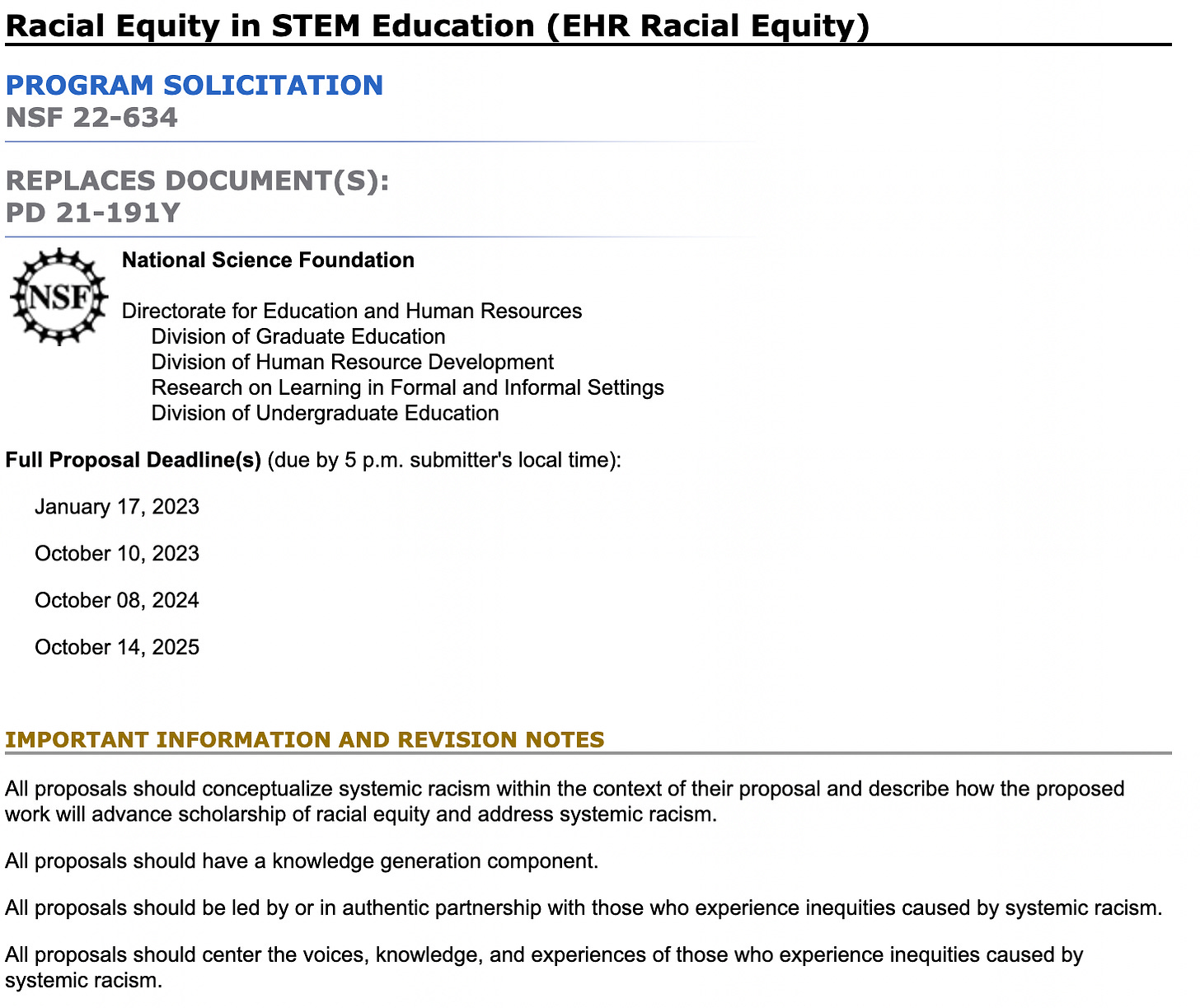Nothing Serious Funded
the NSF is all-in on the social justice model
I’ve written many times about the National Science Foundation and its increasingly politicized conception of “science.” As an independent federal agency with a nearly $9 billion budget, the NSF is a behemoth in the world of academic science, shaping research agendas and the future of the professoriate. And apparently the future of science is BAJEDI (Belonging Accessibility Justice Equity Diversity and Inclusion), which is quite a bit cooler than mere DEI. Here’s a current funding opportunity for scientists:
The federal agency that funds research projects like “Probing Nucleation and Growth Dynamics of Lithium Dendrites in Solid Electrolytes” is moving hard into the business of social justice, with career-making grants that will focus STEM researchers on the problem of racial grievances. Here’s how much money is available for that racial equity program:
The premise underlying this turn toward equity-focused science projects is that “science scholars who are underrepresented in STEM produce higher rates of scientific novelty.” Innovation is grounded in race and ethnicity; the more gloriously intersectional you are, the more creative you become. Imagine the boldness of a transgendered Asian Pacific Islander astrophysics, and how much newer and fresher our conception of the universe is when it doesn’t come from straight white males.
And so the NSF wants to fund “diversity champions” who will freshen up our science with BIPOC innovation — which means adding more sociologists to the team of geophysicists: “When developing proposals, the PI team should acknowledge the need for increased engagement from social and behavioral science experts to address issues related to BAJEDI in the geosciences and include these best practices and experts in proposed projects.” Here’s what that program in the geosciences — link is above, but here it is again — proposes to fund:
It’s a real cultural revolution in the world of academic science.
The premise that novelty is connected to underrepresentation comes from this study, by the way: “The Diversity–Innovation Paradox in Science.” The authors of that remarkable paper reviewed science dissertations, then guessed at the identity of the authors: “Specifically, we link ProQuest dissertations to the US Census data (2000 and 2010) and Social Security Administration data (1900 to 2016) to infer demographic information on students’ gender and race (i.e., name signals for white, Asian, or underrepresented minority [Hispanic, African American, or Native American].”
Sorry, they didn’t guess — they inferred through name signals. Here, let’s test that scientific approach: Take the name John Ross and infer his ethnic identity. Now check your work.
Their conclusion: “Additionally, intersectional analyses of gender–race combinations suggest that nonwhite women, white women, and nonwhite men all have higher rates of novelty compared to white men (all P < 0.001) but that white men have higher levels of impactful novelty compared to the other groups (all P < 0.01). Combined, these findings suggest that demographic diversity breeds novelty and, especially, historically underrepresented groups in science introduce novel recombinations, but their rate of adoption by others is lower, suggesting their novel contributions are discounted.”
The researchers do offer this warning about their conception of scientific novelty, though, so keep it in mind: “Novelty in itself does not automatically imply innovation, nor is the future adoption of novelty a prerequisite to innovation—for example, which novelty gets adopted may be in itself a function of structural processes.”
This super-important piece of research is now helping to guide hundreds of millions of dollars of federal research funding.
Is any of this what you imagine when you hear about the federal funding of science?




If non-whitemen have a higher rate of novelty overall, but whitemen have a higher rate of *impactful* novelty, doesn't that rather suggest that non-whitemen generate more ideas that are useless and unworkable?
Dr. Lysenko . . . Dr. Trofim Lysenko . . . please call your office.